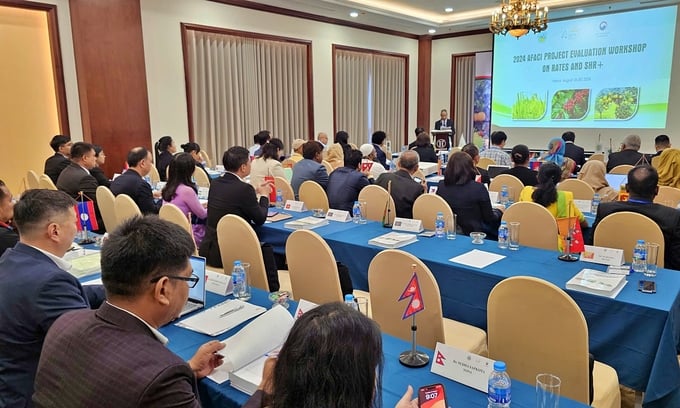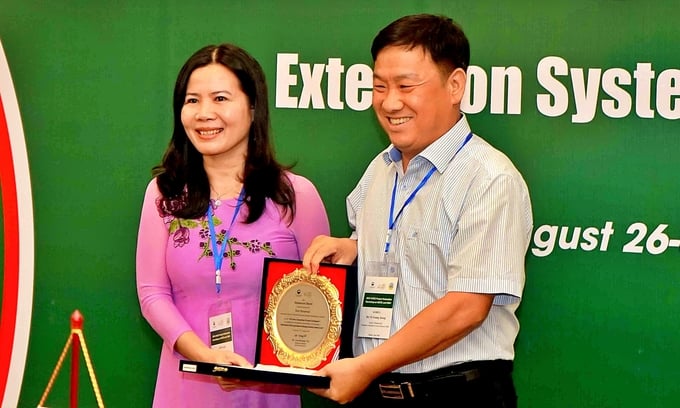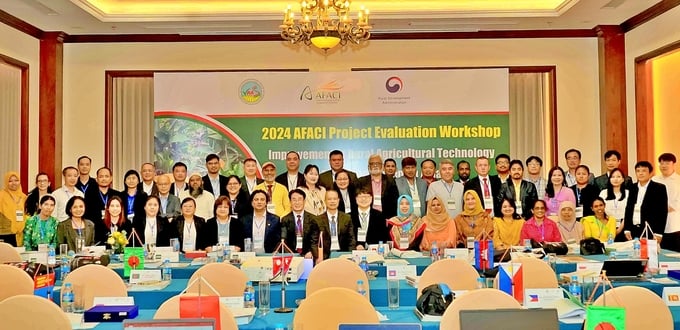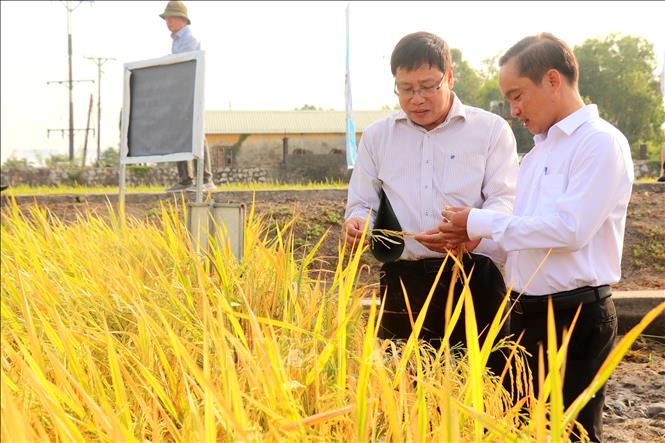May 20, 2025 | 05:22 GMT +7
May 20, 2025 | 05:22 GMT +7
Hotline: 0913.378.918
May 20, 2025 | 05:22 GMT +7
Hotline: 0913.378.918

This year’s conference took place over three days, from August 27 to 29, including two field trips to VAAS and Cao Phong district, Hoa Binh province. Photo: Bao Thang.
On the morning of August 27, the Vietnam Academy of Agricultural Sciences (VAAS), in collaboration with the Rural Development Administration of Korea (RDA) organized the Annual Evaluation Workshop of the Strengthening Agricultural Extension Activities in Asia (RATES) Project and the High-Yield, Stress-Resilient Rice Varieties Project for Member Countries (SHR+).
The two projects, under the Asian Food and Agriculture Cooperation Initiative (AFACI), aim to improve food production and promote sustainable agriculture in several Asian countries, including Vietnam.
Established in November 2009 in Seoul, Korea, AFACI currently consists of 15 member countries: Bangladesh, Bhutan, Cambodia, Laos, Indonesia, Kyrgyzstan, Mongolia, Myanmar, Nepal, Philippines, Sri Lanka, Thailand, Uzbekistan, Vietnam and Korea.
Through knowledge and technology transfer and sharing, AFACI will implement, manage, finance, and coordinate multilateral projects, training and international workshops.
AFACI's vision is to establish a network of Asian countries to work together to address issues of food production, sustainable agriculture, and industrialization in the food and agricultural sectors.
In its 15-year history, AFACI has held six congresses. The AFACI Secretariat and the Korean Rural Development Administration have implemented 25 projects in member countries, of which six are ongoing.
Every year, the AFACI Secretariat and specialized agencies under the Korea Rural Development Agency conduct project implementation evaluations in several member countries. In 2024, Vietnam was selected to evaluate the implementation results of the RATES and SHR+ projects and discuss plans to effectively replicate these projects in the future.

Deputy Director of the Cuu Long Delta Rice Research Institute, Ms. Nguyen Thuy Kieu Tien (left), received the honor of the outstanding project in 2023 from AFACI. Photo: VAAS.
The RATES project aims to strengthen agricultural extension systems and enhance extension capacity in member countries. Currently, 13 member countries are coordinating the implementation and includes 3 components: (1) Establishing and analyzing the agricultural system base through surveys, focus group discussions and stakeholder consultations; (2) Improving the capacity of agricultural extension officers and farmers through training and workshops; (3) Strengthening agricultural extension strategies and activities through implementing effective approaches to technology dissemination and demonstration on a variety of agricultural products.
The RATES project in Vietnam is led by VAAS and will be implemented from 2023 to 2025.
Meanwhile, the SHR+ project focuses on utilizing rice varieties with the ability to withstand a variety of biotic and abiotic stresses developed by the International Rice Research Institute (IRRI), funded by AFACI. SHR+ hopes to develop, test and disseminate superior rice varieties in 11 member countries in South and Southeast Asia.
The project has three main components: (1) Establishing a network of standard operating procedures testing in identified countries; (2) Evaluating and identifying superior varieties with desirable characteristics such as drought, flood and salinity tolerance, and high yield potential; (3) Building capacity for participating member countries.
Along with enhancing capacity in modern rice breeding technology, AFACI member countries hope to improve rice productivity. In Vietnam, the SHR+ Project is implemented by the Cuu Long Delta Rice Research Institute from 2022 to 2024.

Delegates attending the conference. Photo: Bao Thang.
On behalf of the host country, Prof. Dr. Nguyen Hong Son, Director of VAAS, said the workshop was an opportunity for 15 AFACI member countries to discuss, exchange and share experiences. Hopefully, by the end of the workshop, we will have more motivation and ways to cooperate, effectively disseminate the AFACI Initiative, and strengthen this network.
Dr. Seol Kuk-Hwan, Deputy Secretary General of AFACI, acknowledged that Asia is facing challenges in food security as well as climate change. Therefore, the sharing at the workshop will contribute significantly to helping many people in the continent ensure food and nutrition in the current context.
Dr. Myoung Rae-cho, Director of KOPIA Vietnam, acknowledged that from initial efforts, AFACI has now been widely deployed in many Asian countries, helping to spread and develop strong partnerships between countries. "The project results have exceeded initial expectations while bringing many practical benefits to Asian agriculture in particular and the world in general," he said.
Sharing more about the ongoing rice variety research projects, Dr. Sankalp Bhosale, IRRI representative, informed that more than 40 models in 11 countries are currently testing rice varieties selected by IRRI. Testing and testing on a large scale of these varieties helps people have more choices, as well as increasing the ability to create superior varieties that are resistant and ensure productivity.
"Short-term varieties tolerant to salinity and waterlogging are being tested in Vietnam, Cambodia and Sri Lanka. While longer-term varieties are being deployed in Indonesia, Myanmar, Nepal, Laos and Bangladesh," he said, adding that in the coming period, some superior varieties may be considered for registration in the testing countries.

The Cuu Long Delta Rice Research Institute is researching many rice varieties. Photo: VNA.
Also within the framework of the workshop held in Hanoi, the AFACI Secretariat announced the ranking of outstanding projects in the past year. Deputy Director Nguyen Thuy Kieu Tien, on behalf of the Cuu Long Delta Rice Research Institute, was the representative of Vietnam to be honored.
Addressing VAN’s questions, Ms. Tien said that through the SHR+ Project, the Cuu Long Delta Rice Research Institute has received materials such as drought-, flood-, salinity-resistant, and round-grain Japonica rice varieties. This contributes to improving rice productivity and quality while helping to select and create varieties suitable for each country's natural, economic, and social conditions, including Vietnam.
"Resources of materials that can withstand flooding and salinity are valuable to the Mekong Delta. With climate change becoming increasingly complex and unpredictable, we hope to soon create hybrid varieties that can be widely produced," Ms. Tien said.
In the coming time, the Cuu Long Delta Rice Research Institute will continue to research and compare the yield, quality, and resistance between the seeds provided by IRRI and those produced by farmers. From there, it will help ensure rice production in the entire region.
Translated by Quynh Chi
![Reducing emissions from rice fields: [Part 1] Farming clean rice together](https://t.ex-cdn.com/nongnghiepmoitruong.vn/608w/files/news/2025/05/05/z6509661417740_a647202949c539012a959e841c03e1d3-nongnghiep-143611.jpg)
(VAN) Growing clean rice helps reduce environmental pollution while increasing income, allowing farmers to feel secure in production and remain committed to their fields for the long term.
/2025/05/19/5136-1-144800_230.jpg)
(VAN) The Nghe An Provincial People's Committee has just approved the list of beneficiaries eligible for revenue from the Emission Reductions Payment Agreement (ERPA) in the North Central region for the year 2025.

(VAN) 14 out of 35 domesticated elephants in Dak Lak province have had their living conditions improved, with 11 of them currently participating in the non-riding elephant tourism model.

(VAN) Muong Nhe Nature Reserve hopes that being upgraded to a national park will lay the foundation for forest protection efforts to be carried out in a systematic, modern, and sustainable manner.
/2025/05/16/3923-2-171845_52.jpg)
(VAN) Lower costs, higher yields, and improved soil quality are outstanding benefits that soybeans bring when integrated into the crop rotation system.

(VAN) The 'For a Green National Environment' programme aims to promote a green lifestyle, support businesses in implementing ESG practices, and turn Net Zero commitments into concrete actions.

(VAN) Cold-barn systems efficiently manage environmental and temperature conditions, which aids in the prevention of respiratory diseases in pigs and protects them from the vectors that transmit African swine fevers.